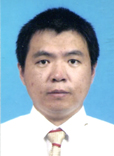
Xiuquan He, Ph.D., M.D.
Senior Experimentalist, Department of Anatomy
ShandongUniversity, School ofBasicMedical Sciences
PERSONAL DATA
Room1310,TeachingBuilding No. 1 44 Wen Hua Xi Lu
Department of Anatomy Jinan,Shandong,China
School ofBasicMedical Sciences,ShandongUniversity
Jinan,Shandong,China
E-mail: hxaq3000@sdu.edu.cn
Phone:0531-88382093
Cell phone:
______________________________________________________________________________
EDUCATION
Doctor of Anatomy,Histology andEmbryology June,2012
ShandongUniversity,Jinan,Shandong,China
Master of Anatomy, Histology and Embryology June, 2004
ShandongUniversity, Jinan, Shandong,China
Doctor of Medicine (Equivalent) June, 1998
TaishanMedical College,Taian, Shandong,China
______________________________________________________________________________
PROFESSIONAL EXPERIENCE
2013-present Senior Experimentalist,Department of Anatomy,ShandongUniversity
Schoolof Medicine,Jinan,China
2017-2018 Visiting scholar,Department of Neurosurgery, Stem Cell Center,
University of Texas Medical School, Houston, TX
2003-2013 Experimentalist,Department of Anatomy, Shandong University
Schoolof Medicine, Jinan,China
2007-2009 Visiting scholar,Department of Anatomy & Neurobiology,
Universityof Kentucky School of Medicine, Lexington, KY
1998-2003 Assistant Experimentalist,Department ofhistology and embryology,
ShandongUniversity School of Medicine, Jinan,China
______________________________________________________________________________
RESEARCH INTERESTS
Major research interests focus on the molecular and cellular mechanisms underlying the neurodegenerative diseases. Currently, there aretworesearch projects are actively carried on in the laboratory:
1. The role of neuro-inflammatory processes in the etiology and pathophysiology of in the etiology and pathophysiology of neurodegenerative disease.
2.The role of microRNA in the etiology and pathophysiology of neurodegenerative disease.
3. The research of fluorescent probes.
TEACHING EXPERIENCE
ShandongUniversityCollegeof Medicine
2010-2019 PBL;Tutor
1998-2009 Histology and Embryology;Lecturer
PUBLICATIONS:
1.Guo L, Tian M, Feng R, Zhang G, Zhang R, Li X, Liu Z,He X (Co-corresponding author), Sun JZ, Yu X. Interface-Targeting Strategy Enables Two-Photon Fluorescent Lipid Droplet Probes for High-Fidelity Imaging of Turbid Tissues and Detecting Fatty Liver. ACS Appl Mater Interfaces. 2018 Apr 4;10(13):10706-10717.
2.Zhang R, Sun Y, Tian M, Zhang G, Feng R, Li X, Guo L, Yu X, Sun JZ,He X (Co-corresponding author). Phospholipid-Biomimetic Fluorescent Mitochondrial Probe with Ultrahigh Selectivity Enables In Situ and High-Fidelity Tissue Imaging. Anal Chem. 2017 Jun 20;89(12):6575-6582.
3.Li X, Tian M, Zhang G, Zhang R, Feng R, Guo L, Yu X, Zhao N,He X (Co-corresponding author). Spatially Dependent Fluorescent Probe for Detecting Different Situations of Mitochondrial Membrane Potential Conveniently and Efficiently. Anal Chem. 2017 Mar 21;89(6):3335-3344.
4. Tian M, Liu Y, Sun Y, Zhang R, Feng R, Zhang G, Guo L, Li X, Yu X, Sun JZ,He X (Co-corresponding author). A single fluorescent probe enables clearly discriminating and simultaneously imaging liquid-ordered and liquid-disordered microdomains in plasma membrane of living cells. Biomaterials. 2017 Mar;120:46-56.
5.Sun H,He X(Co-first author), Liu C, Li L, Zhou R, Jin T, Yue S, Feng D, Gong J, Sun J, Ji J, Xiang L. Effect of Oleracein E, a Neuroprotective Tetrahydroisoquinoline, on Rotenone-induced Parkinson's Disease Cell and Animal Models.ACS Chem Neurosci. 2016 Oct 12.
6.Guo L, Zhang R, Sun Y, Tian M, Zhang G, Feng R, Li X, Yu X,He X(Co-corresponding author). Styrylpyridine salts-based red emissive two-photon turn-on probe for imaging the plasma membrane in living cells and tissues. Analyst. 2016,141(11):3228-32.
7.Wang PP, Sun HX, Liu CJ, Hu MH,He XQ, Yue S, Jiao ZZ, Xiang L. Racemic oleracein E increases the survival rate and attenuates memory impairment in D-galactose/NaNO2-induced senescent mice. Phytomedicine. 2016,15;23(5):460-7.
8.Ge Zhang, Yuming Sun,Xiuquan He, Weijia Zhang, Minggang Tian, Ruiqing Feng, Ruoyao Zhang,Xuechen Li, Lifang Guo, Xiaoqiang Yu, Shangli Zhang, Red-Emitting Mitochondrial Probe with Ultrahigh Signal-to-Noise Ratio Enables High-Fidelity Fluorescent Images in Two-Photon Microscopy. Analytical Chemistry. 2015, 87(24), 12088−12095.
9.Wang Y, Wen M, Kwon Y, Xu Y, Liu Y, Zhang P,He X, Wang Q, Huang Y, Jen KY, LaBarge MA, You L, Kogan SC, Gray JW, Mao JH, Wei G. CUL4A induces epithelial-mesenchymal transition and promotes cancer metastasis by regulating ZEB1 expression. Cancer Res. 2014, 74(2):520-31.
10.Lu J, Wen M, Huang Y,He X(Co-first author), Wang Y, Wu Q, Li Z, Castellanos-Martin A, Abad M, Cruz-Hernandez JJ, Rodriguez CA, Pérez-Losada J, Mao JH, Wei G. C2ORF40 suppresses breast cancer cell proliferation and invasion through modulating expression of M phase cell cycle genes. Epigenetics. 2013, 8 (6):571-83.
11.Xing AY, Wang B, Shi DB, Zhang XF, Gao C,He XQ, Liu WJ, Gao P. Deregulated expression of miR-145 in manifold human cancer cells. Exp Mol Pathol. 2013,95(1):91-7.
12.Wang Y, Ma G, Wang Q, Wen M, Xu Y,He X, Zhang P, Wang Y, Yang T, Zhan P, Wei G. Involvement of CUL4A in regulation of multidrug resistance to P-gp substrate drugs in breast cancer cells. Molecules. 2013,19(1):159-76.
13..Xiuquan He, Lei Feng, Haiwei Meng, Xiaohong Wang, Shuwei Liu, Rosiglitazone protects dopaminergic neurons against lipopolysaccharide-induced neurotoxicity through inhibition of microglia activation, Int J Neurosci, 2012, 122 (9):532-540.
14.Bradley LH, Fuqua J, Richardson A, Turchan-Cholewo J, Ai Y, Kelps KA, Glass JD,He X, Zhang Z, Grondin R, Littrell OM, Huettl P, Pomerleau F, Gash DM, Gerhardt GA. Dopamine neuron stimulating actions of a GDNF propeptide. PLoS One. 2010,18;5(3):9752.






